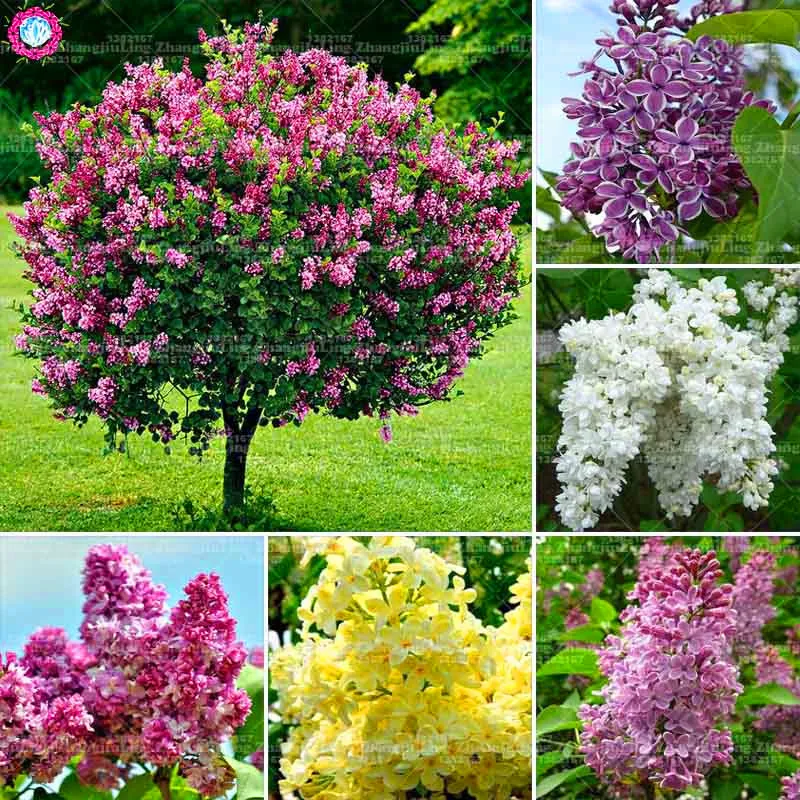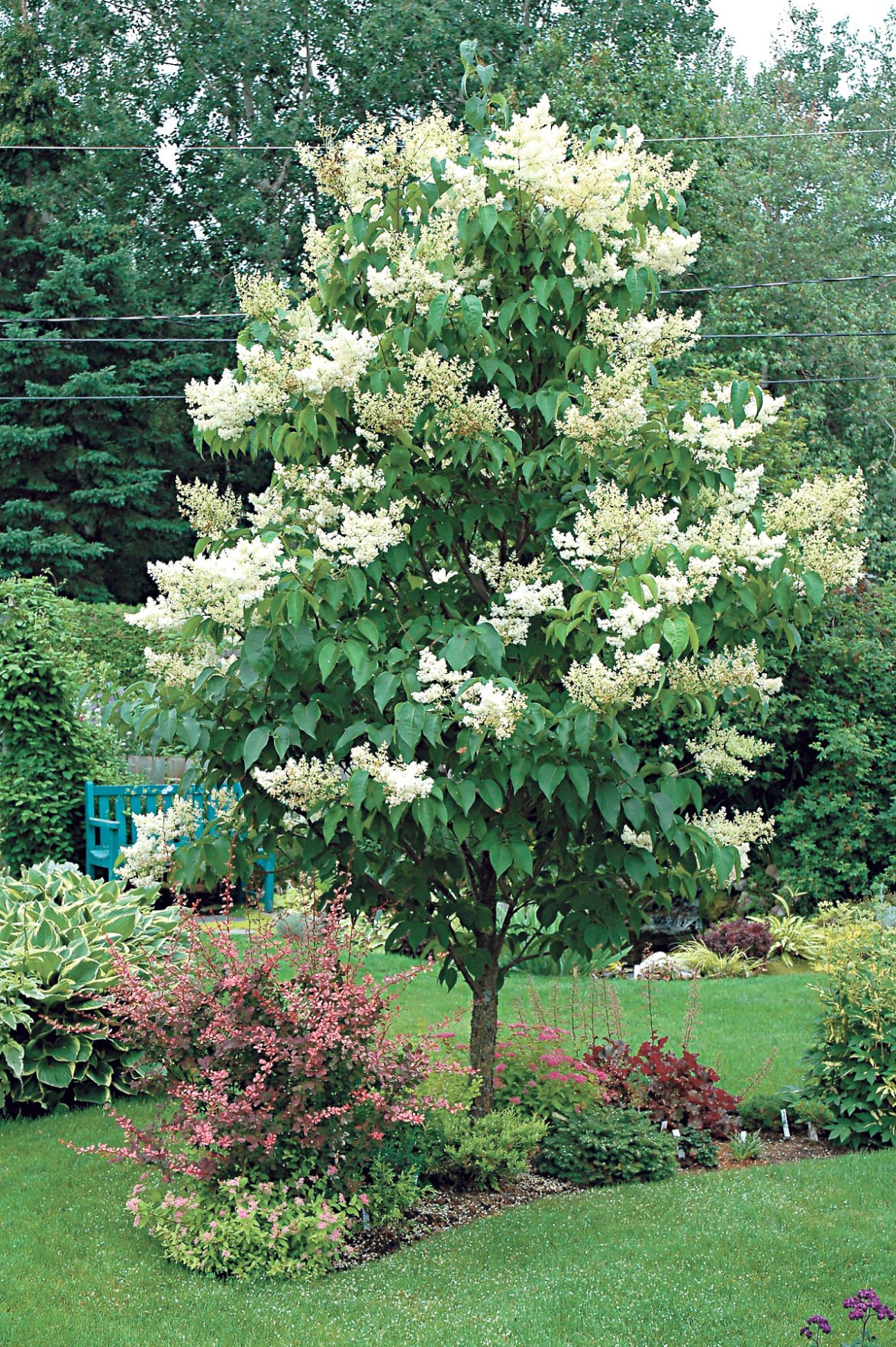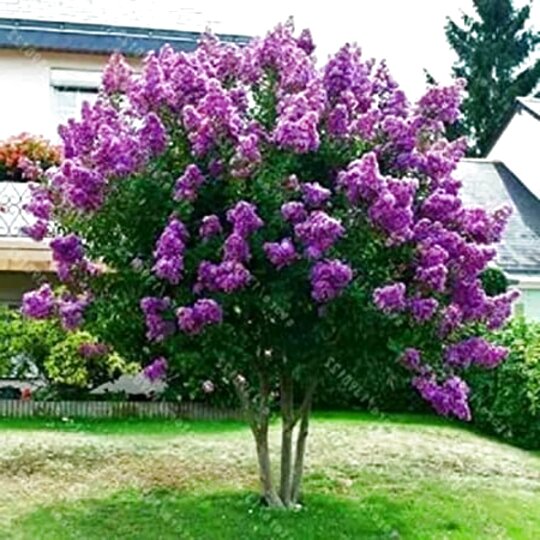
9 Helpful Tips for Growing a Beautiful Lilac Tree at Home Garden and
Yes - this is a lilac tree, though it doesn't come in the traditional purple flowers like we are use to! These underused tree are full of fragrance and display a wondrous snowy blossom no matter what maturity level the tree is at.

Japanese Tree Purple Lilac Seeds Perennial Powerful
Details Wise landscape designers plan for bloom throughout the whole growing season. The best thing about Japanese Lilac Trees (Syringa reticulata) is they start blooming at a time when all of the spring-flowering shrubs and trees are done blooming. This is the last Japanese or Shrub Lilac to bloom, and it's a must-have in your landscape.

Purple lilacs January through April Lilac Flowers, Purple Lilac
The covering soil of Japanese lilac tree shall be 3 ~ 4cm lower than the basin mouth, poured with water, placed in the shade, and then moved to the place with sufficient light. Japanese lilac tree bonsai should use medium deep pottery basin or glazed pottery basin. Japanese Lilac Tree Light Japanese lilac tree is a plant that likes sunshine.

100 PCS Lilac plant Purple Japanese Lilac (Extremely Fragrant) Clove
The Japanese lilac tree, or Syringa reticulata, is classified as both a large shrub and a small tree. This ornamental has creamy white flowers that fill the summer air with their abundant floral fragrance. As its name suggests, the Japanese lilac is native to Japan. It grows abundantly in cool climates but can suffer in hot climates.
:max_bytes(150000):strip_icc()/japanese-lilac-tree-care-and-growing-guide-4589076_06-0ae424c6ca4448168acd097785c6af38.jpg)
Japanese Lilac Tree Plant Care & Growing Guide
Ivory silk tree lilacs do not resemble any other lilacs you might have in your garden. Also called Japanese tree lilac, the 'Ivory Silk' cultivar is a large, rounded shrub with very large clusters of off-white flowers.Ivory Silk Japanese lilac is not trouble free, however. Although the problems with Japanese tree lilacs are few and far between, you'll want to know about treating problems.

purple flowers are blooming on the tree in front of a white picketed fence
Growing 6-8 feet tall and wide, it has a slightly smaller stature and rounder habit than many of its lilac peers. Use it as an accent or backdrop planting for a dramatic effect. Syringa vulgaris 'Primrose'. Syringa vulgaris 'Primrose' is a very rare variety with original lemon-yellow blooms. Bloom time: late spring.

JAPANESE TREE LILAC Foothills Nurseries
Lilac Bushes from Spring Hill: Look for lilac flowers to burst open beginning in spring, with long canes producing voluminous pink, yellow, white, red, purple or blue blooms. Plant a lilac shrub and enjoy daily visits from hummingbirds and butterflies throughout the flowering season.

Japanese Tree Lilac Select Seedling Nursery Order Online Saskatoon
What is a Japanese Lilac Tree? Japanese lilacs are trees or very large shrubs that grow to a height of up to 30 feet (9 m.) with a spread of 15 to 20 feet (4.5-6 m.). The genus name Syringa means pipe, and refers to the plant's hollow stems. The species name reticulata refers to the network of veins in the leaves.
:max_bytes(150000):strip_icc()/japanese-tree-lilac-817662_1920-30b44b54eb6b4764ab881f504f5a52fe.jpg)
Japanese Lilac Tree Care and Growing Guide
Syringa reticulata (Japanese Tree Lilac) is a large shrub or small tree with an oval to rounded crown. In early summer, a profusion of huge clusters, 6-12 in. long (15-30 cm), packed with musky-scented, tiny creamy-white flowers adorn the tree for about two weeks.

Gary Church Japanese lilac tree hardy enough to survive in cement
Lustrous dark green foliage is slightly larger and darker than the species. Snowdance grows as wide as it is tall with attractive, shelved branching. A pest- and disease-free lilac tree, it is ideal for residential and park use and is equally attractive as a specimen as it is in group plantings. Height: 18'. Spread: 20'. Exposure: Bloom: Spring.

Purple Lilac Tree for sale in UK 60 used Purple Lilac Trees
Suitable Climate And Soil Conditions. Japanese Lilac trees, also known as Syringa reticulata, are a type of deciduous tree that can grow up to 20 feet tall in ideal climates. For example, James and his wife recently moved to the Midwest and were interested in planting a Japanese Lilac Tree in their backyard. As a botany specialist, I advised them that the tree requires certain climate and soil.

Japanese Lilac Tree
It grows 15 to 30 feet tall and 15 to 20 feet wide, larger than other lilacs, and the canopy develops in a pleasing oval or round shape that is wider at the base and narrower at the top. The tree blooms a little later than the common lilac, in June instead of May.

Japanese tree lilac Google Search Horticulture, Purple Flowers, White
The Japanese lilac ( Syringa reticulata) is a deciduous tree-form lilac attractive enough to serve as a specimen. It has a moderate growth rate, an upright growing habit, and a rounded shape.
:max_bytes(150000):strip_icc()/japanese-lilac-tree-care-and-growing-guide-4589076_03-36e1ded3d77f45bca78ab07f0f287bde.jpg)
How to Grow and Care for a Japanese Lilac Tree
It is a true tree. As the name implies, this tree is native to Japan. Even so, it grows well in any location between 3-7 on the USDA hardiness chart. One of the most alluring visuals of the Japanese Lilac is its oval crown. The bark has a reddish tone and peels somewhat like birches. Then too, there are flowers (did we mention flowers?).

Japanese Lilac Tree Syringa reticulata 1 Gallon Potted Etsy Lilac
Lilac Shrubs Overview Where to Plant Lilac Because lilacs come in a large range of sizes, from dwarf lilacs to tree lilacs, matching the variety to the available space in your yard is crucial.

Japanese Tree Lilac Knecht's Nurseries & Landscaping
The Japanese Lilac Tree boasts beautiful fragrant blooms that are typically white or pale purple. The blooms appear in late spring to early summer, and the tree's leaves turn a lovely yellow in the fall before they drop. When choosing a location for your Japanese Lilac Tree, keep in mind that it thrives in full sun and well-drained soil.